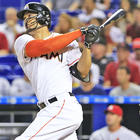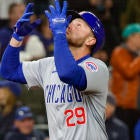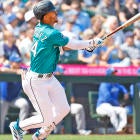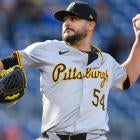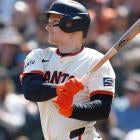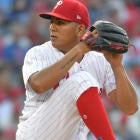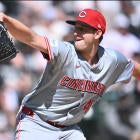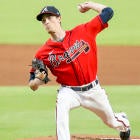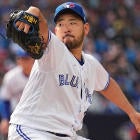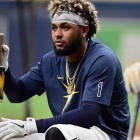Editor's Note: The Paths to Glory series is intended to serve as a starting point for your team. As we all know, baseball drafts become unpredictable as spring training progresses, but the three options provided here should put you on the right path.
Considering he has never put together a 40-homer season, it's kind of funny that Giancarlo Stanton is considered the game's preeminent power hitter
But of course, it's not that simple. Each of his past four seasons was shortened by injury. If he hadn't broken his hand last year, he might have hit 50.
His per-game production is terrific and well deserving of a first-round pick, but he's not a slam dunk to hit the most home runs of those being drafted in that range. His reputation, then, may also have something to do with what he doesn't do well: hit for average.
While he has twice been an asset in that category, he's a better bet to hit .260 or not, and considering batting average is probably the most difficult hitter category to correct later in the draft, you'll have to account for his shortcoming from the get-go.
Unfortunately, the middle of the second round is the most logical time to target what are in my mind the clear second- and third-best starting pitchers in the game, Max Scherzer and Jake Arrieta. The unfortunate part isn't that you might feel compelled to take a pitcher. Stanton doesn't help in any of the pitching categories, after all. It's just that you'd be passing up an opportunity to diversify in the hitter categories that you may not get in the middle of Round 3, where power-hitting outfielders dominate.
You already have one of those.
Of course, Stanton was never going to be your only source of power or your only outfielder, so maybe doubling down with J.D. Martinez early isn't a real problem. If Corey Seager, Michael Brantley and Freddie Freeman are the next three picks, it digs you out of whatever hole you created in batting average while also filling the weakest position (shortstop) and avoiding the big drop-off at first base.
What it doesn't do is address stolen bases, apart from the 20 or so that Brantley figures to provide. It also asks you to put all your eggs in one basket at starting pitcher since the many with ace potential figure to be off the board by the end of Round 6.
Buster Posey at least makes up for Stanton's weakness in batting average, and of course drafting him gives you a considerable advantage over the rest of the league at one position. George Springer would be a lucky get in the middle of the third round, which is why he didn't appear in the first scenario, but since he offers some benefit in stolen bases, he would clearly be the preferred choice to Martinez.
This path, like the Arrieta one, is guilty of outfield overkill. Even in a league that requires five, drafting three in the first six rounds sacrifices too much at other positions that don't allow for as many sleepers. And because Arrieta isn't being selected here, a second starting pitcher becomes a top priority, preempting another premium position. Jose Fernandez and Chris Archer do complement each other nicely, though, with one being a mild injury risk and the other a mild performance risk. Clearly, strikeouts won't be an issue.
The Yasiel Puig pick should make you uneasy simply because nobody has any idea what to expect from him anymore, but he's young and was a second-rounder each of the last two years. There comes a point when somebody has to take him, and the sixth round is it. The category where he'll probably do the most good is batting average, which would also be true for Freeman -- a player who better meets your positional needs. But no guarantees he'll be there for the taking.
in the second round combines elite power with elite speed while reconciling batting average and filling a premium position. The biggest downside is that you'd be beginning your draft with two Marlins, which normally isn't such a big deal in Fantasy Baseball, but wow, that's a bad team.
It may be worth it, though, to get that perfect complement of numbers. Hop aboard the expected third-round pitching run, and your team has zero weaknesses three rounds in.
Gordon is such a standout in stolen bases that you're more likely to fall behind in home runs over the next few rounds, so a power hitter like Carlos Gonzalez makes for a terrific fourth-round pick. If you wanted to continue down the position scarcity path, Corey Seager would work, but then it's harder to justify the second pitcher in the fifth round over a more proven bat.
Corey Dickerson rounds out this group nicely because he'll join with Gordon to give your team an advantage in batting average even if Stanton and Gonzalez combine to .260. Plus, he gives you a third power bat to keep all the hitter categories balanced. Once again, you risk overdoing it in the outfield with this approach, so if Freeman is indeed available in Round 6, he's probably the preferred choice to Dickerson.
















